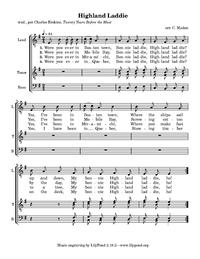Highland Laddie

“Highland Laddie” is a sea chantey.
Alternate names
- Hieland Laddie
External links
Liner Notes
“Highland Laddie” is track 12 on Shower Chanteys, recorded 26 February 2018 at Mill Pond Music Studio.[1][2]
This is the oddest song on the album… but let me start with the boring stuff.
“Highland Laddie” is a walkaway or stamp-and-go chantey, according to Hugill,[3] though it is also used as a halyard chantey.[4] The tune is an old Scottish march, and there are a few significant versions. One tells the story of a Scottish lad who goes off to seek his fortune, often on a whaling vessel. A second is rhymed couplets, usually about specific places. A third, called “Donkey Riding,” is similar to the second, but with a three-line call and one-line response, instead of of the pairs of calls-and-responses that the first two have.[5]
This version, you may note, is not quite any of those three…
At the top level of rewards for my Kickstarter backers was the opportunity to request a song, any traditional chantey, whether or not I already knew it. My primary backer, who is also an antiquarian, sent me a copy of Twenty Years Before the Mast by Charles Erskine, and told me to record something out of it. The book is full of mediocre poetry, often titled “Sailor’s Ditty.” There are however, two definite chanteys in chapter XVIII:[6] “Highland Laddie” and “Fire Maringo.”
Now, “Fire Maringo” (or “Fire Marengo”) is only known from this source and from Charles Nordhoff,[7] so this is an important source and at least partly validated. However, while both Erskine and Nordhoff give “Highland Laddie” right next to “Fire Maringo,” Erskine’s version is… odd.
It has five lines per verse![8]
There is just no way… well, almost no way that this was ever actually used as a work-song in the way Erskine describes. Given the overall quality of his writing and especially his poetry, together with the fact that he states he was illiterate when he first went to sea, I am going to say that he misremembered this song, possibly putting it through a too-literate filter later in life. “Hieland Laddie” is so well-attested, and always in a four-line verse, that while it’s possible, it is overwhelmingly unlikely that this five-line version was actually used as a worksong and Erskine’s is the only surviving testimony about it.
Nonetheless, it was too weird and interesting not to try and record. I cobbled together a melody from the more common version of “Hieland Laddie” and from “Donkey Riding,” and gave it a whack. I only used the specific verses that Erskine gives; I certainly could have taken many of the usual other “Hieland Laddie” couplets and put them into this pattern, but I kind of wanted to hold this up as an unaltered artifact from Erskine’s memoir.
References
- ↑ “Highland Laddie,” recording by Chris Maden. MusicBrainz.
- ↑ Chris Maden. “Rough cuts from Monday, and a question for backers,” Kickstarter update. 28 February 2018.
- ↑ Stan Hugill. Shanties from the Seven Seas, pp. 115–120. New U.S. Edition. Mystic, Conn.: Mystic Seaport, 1994.
- ↑ Glenn Grasso, ed. Songs of the Sailor, pp. 27–28. Mystic, Conn.: Mystic Seaport, 1998.
- ↑ Joanna C. Colcord. Songs of American Sailormen, pp. 94–95. Enlarged and Revised Edition. New York: Bramhall House, 1938.
- ↑ Charles Erskine. Twenty Years Before the Mast, pp. 297–298. [Probable first edition.] Boston: Morning Star Press, 1890. See also Charles Erskine. Twenty Years Before the Mast. [Later edition.] Philadelphia: George W. Jacobs & Co., 1896. Wikisource version.
- ↑ Charles Nordhoff. Nine Years a Sailor, p. 42. Cincinnati: Moore, Wilstach & Baldwin, 1866. Google Books version.
- ↑ Chris Maden. “Weird-meter chanteys,” Kickstarter update. 1 February 2018.